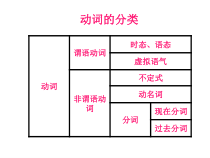 PPT
PPT
【文档说明】专插本语-9动词时态语课件.ppt,共(48)页,388.012 KB,由小橙橙上传
转载请保留链接:https://www.ichengzhen.cn/view-257963.html
以下为本文档部分文字说明:
动词谓语动词时态、语态虚拟语气非谓语动词不定式动名词分词现在分词过去分词动词的分类语态时态主动一般现在时一般过去时一般将来时.过去将来时过去完成时现在完成时将来完成时现在进行时过去进行时v./v.svedwill+vwould+v.had+Vp.p
have/has+Vp.pwillhave+Vp.pam/is/are+Vingwas/were+Ving时态和语态的主要考点1、考查在语境中判断动词时态的运用能力。常考的时态为:一般现在、一般过去、一般将来、现在进
行、过去进行、现在完成、过去完成、现在完成进行、过去将来等。2、时间、条件、让步等状语从句中动词的时态;主从句时态呼应问题。3、几种时态的替代问题.一般现在4.every…,sometimes,at…,onSundays现在完成现在进行过去进行过去完成过去将来一般将来一般过去1.for
,since,sofar,ever,never,just,yet,till/until,uptonow,inthepastyears,recently5.yesterday,lastweek,anhourago,theotherday,in1982,justnow2.多用在间接引语中表示发
生在谓语动作以后的动作6.…before,by,until,when,after8.next…,tomorrow,in…3.now…7.thismorning,thewholemorning,allday,yesterday,fr
omninetotenlastevening…when,while48713625最常用的几种时态与时间状语的搭配一般现在every…,sometimes,at…,onSunday现在进行now,现在完成for,si
nce,sofar,ever,never,just,yet,till/until,uptonow,inthepastyears,always,recently一般过去yesterday,lastweek,anhourago,theotherday,i
n1982,justnow过去进行thismorning,thewholemorning,allday,yesterday,fromninetotenlastevening…when,while过去完成…before,by,until,when,aft
er,once,assoonas一般将来next…,tomorrow,in…过去将来多用在间接引语中表示发生在谓语动作以后的动作解动词填空题“三步曲”1..I(have)thisbookfor2weeks.havehadareplante
d一看时间状语2.Everyyear,manytrees(plant)alongtheriver.3.Keepquiet,please!They(have)alesson.arehaving4.---Hi,LinTao.Ididn’tseey
ouattheparty.---Oh,I(get)readyfortheexam.wasgetting5.Tom(go)tobedearly,buthisbrotherdoesn’t.6.Listen!J
im’sradio(make)aloudnoise.Wouldyoupleasetellhimtoturnitdown?goesismaking二观上下文联系三找隐含条件1一般现在时的用法1)经常性或习惯性的动作1.I______ping-pongqui
tewell,butIhaven’thadtimetoplaysincethenewyear.A.willplayB.haveplayedC.playedD.play1一般现在时的用法2)客观真理,客观存在,科学事实或表示格言或警句。①K
nowledgebeginswithpractice.②Shesaidthattheseawaterissalty.③Insomepartsoftheworld,suchasinEngland,tea____withmilkandsugar.A.isservi
ngB.servesC.isservedD.served1一般现在时的用法3)按火车、汽车、飞机等时刻表将要发生的事。此时句中有时有将来的时间状语,但不用将来时。此时主主语是物:车,船,飞机等Thetrainleave
satthreethisafternoon.4)在时间、条件、方式、让步状语从句中,用一般现在时代替一般将来时。①Ifitisfinetomorrow,wewillgotothecountryside.2一般过去时的用法1)表示过去发生的,和现在没有联系
的动作或状态。1.----Look!Someonehasspilt(溢出)coffeeonthecarpet.(地毯)----Well,it_____me.A.isn’tB.wasn’tC.hasn’tbeenD.hadn’tbeen2.----I’ve
boughtaboxofchocolatesforourdaughter.---Oh,howgoodadad!Butshedoesn’tlikesweetthings._____that?A.Don’tyouknowB.Haven
’tyouknownC.Didn’tyouknowD.Hadn’tyouknown3.----WasMaryintheofficewhenyouarrivedthere?------Yes,butshe_____soona
fterwards.A.hadleftB.leftC.wouldleaveD.willleave2一般过去时的用法2)注意:一般过去时与过去进行时的区别:一般过去时表示一个完成的动作,而过去进行时则表示一个没有完成且
正在进行的动作。①Iwrotealetterthismorning.今天上午我写了一封信。(信已写完)②Iwaswritingaletterthismorning.今天上午我在写一封信。(正在写,不一定写完)1.----HasTommyfinishedhisjobyet?----I
havenoideaofit;he____itthismorning.A.wasdoingB.hadbeendoingC.hasdoneD.did2.Asshe____thenewspaper,Granny______as
leep.A.read,wasfallingB.wasreading,fellC.wasreading,wasfallingD.read,fell3.一般将来时1.一般将来时表示计划、打算、企图做某事或来注定
要发生的事情。2.表示将来时的四种形式①will/shall+动词原形②begoingtodo③beabouttodo(正要干什么)④betodo①begoingto有很强的计划性,打算干什么,而will表示谈话时临时决定的意图,具有临时性和偶然性。----Thetelepho
neisringing.----I_____answerit.A.willB.amgoingtoC.amtoD.amaboutto---Alice,whydidn’tyoucomeyesterday?---
I_____,butIhadanunexpectedvisitor.A.hadB.wouldC.wasgoingtoD.did②begoingto可用来表达某种迹象要发生的事。而will不能表示Lookattheclouds!It’
sgoingtorain.3.beto和begoingto①表示约定、计划或职责、义务要求即将发生的动作。②betodo安排将要干什么,有很强的计划性,有时=begoingtobeto表示客观安排或受人指示而做某事.begoingto表示主观的打算或
计划。Iamtoplayfootballtomorrowafternoon.I'mgoingtoplayfootballtomorrowafternoon.4.beabouttodo表示“正要干什么…”,表示即将发生的动作,不与表示将来的时间状语连用。常与when连用,when此时意思:就在这时
,是并列连词构成句型:…beabouttodo…when….Iwasabouttoleavewhenitrained.特别注意(1)一般现在时表示将来,特别用于车、船、飞机等时刻表中安排好的。Theplaneleavestomorrow.(尽管
有tomorrow,但没有will,begoingto)(2)某些瞬间动词“go,come,arrive,leave,start,begin,fly,take”等用现在进行时表示将要发生的动作。I’vewonaholidayfort
wotoFloria.I______mymum.A.amtakingB.havetakenC.takeD.willhavebeen4.现在进行时1.表示说话时正在进行而尚未完成的动作或状态。2.表示现阶段一直在进行的动作,但说话时不
一定正在进行。①Idon’treallyworkhere.I’mhelpinguntilthenewsecretarycomes.②Selectingamobilephoneforpersonaluseisnoeasytaskbecausetechnology
___sorapidly.A.willhavechangedB.haschangedC.ischangingD.willchange③----Annworksveryhard.----Infact.It
hinkshe______now.A.studiedB.isstudyingC.studiesD.willstud5.过去进行时1.表示过去某一时间正进行的动作。通常有时间状语(从句),或由上下文表示。1.---Hey,l
ookwhereyouaregoing?-----Oh,I’mterriblysorry._______.A.I’mnotnoticingB.Idon’tnoticingC.Ihaven’tnoticingD.Iwasn’tnoticin
g2.-----Hey,whatdidIsay?-----I_________.A.I’mnotlisteningB.IwasnotlisteningC.Idon’tlistenedD.Ididn’tlisten3.在简单句中
有atthattime,then,thistimeyesterday/lastweek,at10o’clocklastnight等具体的时间状语用过去进行时态。IfirstmetLisathreeyearsago.She____ataradioshopatthetime.A
.hasworkedB.wasworkingC.hadbeenworkingD.hadworked特别注意:与always连用,表示感情色彩。Mybrotherwasalwayslosinghiskey.6.现在完成时1.表示过去发生的某一动作对现在造成
的影响或结果,有时没有时间状语,有时有时间状语。Theyhavecleanedtheclassroom.(Theycleanedtheclassroomandtheclassroomiscleannow.)2.表示过去已经开始,持续到现在而且可能继续下去的动作状态。Hehasn’
tgivenmeanymoretroublesincethen.②----WhendidhegotoAmerica?-----Oh,he______theresincehalfayearago.A.wentB.hasbeenC.hasgoneD.was③Shelly_____Califor
niaforTexasand____thereeversince.YoucangoandpayheravisitonyourwaytoMexico.A.left,workedB.hasleft,hadworkedC.left,hasworkedD.hasleft,worked④Collec
tingstampsasahobby____increasinglypopularduringthepastfiftyyears.A.becomesB.becameC.hasbecomeD.hadbecome7.过去完成时1表示在过去某一时刻或动作之前已经完成了的动作,即“过
去的过去”。请记住:bytheendof+过去时间bethetime+从句(用一般过去时)引导的句子或主句用过去完成时)1.Theoldman_____twodaysafterhehadbeensenttohospital.A.diedB.woulddieC.haddiedD.hasdied2.O
ldMcDonaldgaveupsmokingforawhile,butsoon______tohisoldways.A.returnedB.returnsC.wasreturningD.hadreturned4.I_____tota
keagoodholidaythisyear,butIwasn’tabletogetaway.A.hopeB.havehopedC.hadhopedD.hoped5.Helen_____herkeyintheo
fficesoshehadtowaituntilherhusband_____home.A.hasleft;comesB.left;hadcomeC.hadleft;cameD.hadleft;wouldcome8.现在完成进行时构成:
have/hasbeendoing表示过去某一动作状态一直持续到现在,也可能将持续下去。----Isn’tithardtodrivedowntowntowork?---Yes,that’whyI_____toworkby
train.A.havebeengoingB.havegoneC.wasgoingD.willhavegone9.将来完成时:will/shall+havedone表示将来某一时间之前完成的动作,常与表示将来时间的状语连用,如:bytheendof+将来时间
的短语,bythetime+从句(从句用一般现在时表示一般将来时),这时句子或主句应用将来完成时Wewillhavefinishedtheworkbythetimehecomesback..10.一般将来进行时;willbedoi
ng/shallbedoing表示将来某一时间正在进行的动作Whatwillyoubedoingthistimetomorrow?1.Bytheendofthismonth,wesurely____asatisfactorysolut
iontotheproblem.A.havefoundB.willbefoundC.willhavefoundD.arefinding2.Theconference____afullweekbythetimeitends.A.musthavelastedB.willh
avelastedC.wouldlastD.haslasted1.Hesteppedintotheoffice,_____downandbegantofillintheforms.A.sittingB.tositC.satD.havingit2.Shesaidshe
wouldtelephonebutwe_____fromhersofar.A.haven’theardB.didn’thearC.hadn’theardD.won’thear3.WhenIgottothecinema,thefilm____fo
rtenminutes.A.hasbegunB.hadbegunC.hadbeenonD.was4.I’llgowithyouassoonasI____myhomework.A.willfinishB.finishC.amfinishi
ngD.finished5.Ifit_____tomorrow,Iwon’tgotothecinema.A.willrainB.rainsC.israiningD.rained6.Sheisgoingtobeanursewhenshe_____up.A.isgoingtogrowB.gro
wsC.growingD.grew7.“这本书我已经买了三个月了。”,下列哪一句不对?A.Ihavehadthisbookforthreemonths.B.Ihaveboughtthisbookforthreemonths.C.Ibough
tthisbookthreemonthsago.D.ItisthreemonthssinceIboughtthisbook.8.—Comein,Peter,Iwanttoshowyousomething.—Oh,howniceofyo
u!I_____you_____tobringmeagift.A.neverthink;aregoingB.neverthought;weregoingC.didn’tthink;weregoingD.had’tthought;weregoing9.Wh
enIwasatcollegeI_____threeforeignlanguages,butI_____allexceptforafewwordsofeach.A.spoke;hadforgottenB.spoke;haveforgott
enC.hadspoken;hadforgottenD.hadspoken;haveforgotten10.Thepolicefoundthatthehouse_____andalotofthings____.A.hasbrokeninto;hasbeenstolenB.ha
dbrokeninto;hadbeenstolenC.hasbeenbrokeninto;stolenD.hadbeenbrokeninto;stolen11.Thevolleyballmatchwillbeputo
ffifit____.A.willrainB.rainsC.rainedD.israining12.Mary_____adresswhenshecutherfinger.A.madeB.ismakingC.wasmakingD.makes13
.Thestudents_____busilywhenMissBrownwenttogetabookshe_____intheoffice.A.hadwritten;leftB.werewriting;hasleftC.hadwritten;hadlef
tD.werewriting;hadleft14.—Haveyoumovedintothenewhouse?—Noyet,therooms_____,A.arebeingpaintedB.arepaintingC.arepaintedD.arebeingpainting15.—Weh
aven’theardfromJaneforalongtime.—Whatdoyousuppose____toher?A.washappeningB.tohappenC.hashappenedD.havinghappened16.—Doyouknowourtownatal
l?—No,thisisthefirsttimeI_____here.A.wasB.havebeenC.cameD.amcoming17.—Wecouldhavewalkedtothestation.Itwassonear.—Yes,Ataxi_____atallnecessary.A.wasn
’tB.hadn’tbeenC.wouldn’tbeD.won’tbe18.Ifcitynoises_____fromincreasing,people_____shouttobeheardevenatthedinnertable20yearsfromnow.
A.arenotkept;willhavetoB.arenotkept;havetoC.donotkeep;willhavetoD.donotkeep;haveto19.Tom_____intothehousewhennoone_
____.A.slipped;waslookingB.hadslipped;lookedC.slipped;hadlookedD.wasslippping;looked20.ThelasttimeI_____Janeshe____cottoninthefield
s.A.hadseen;waspickingB.saw;pickingC.hadseen;pickedD.saw;waspicking被动语态一、什么是语态?语态是英语动词的一种表现形式,用来说明主语和谓语动词之间的关系。二、语态的种类:(1)主
动语态(2)被动语态三、什么是主动语态?什么是被动语态?四、被动语态的构成:(八种时态下的被动语态)be+及物动词的过去分词can/may/must…+be+过去分词1)am/is/are+done(过去分词)一般现在时2)has/havebeendone现在完成时3)
am/is/arebeingdone现在进行时4)was/weredone一般过去时5)hadbeendone过去完成时Visitorsareaskednottotouchtheexhibits.(展品)Allthepreparation
sforthetaskhavebeencompletedAnewcinemaisbeingbuilthere.Iwasgiventenminutestodecide.Bytheendoflastyea
r,anothernewgymhadbeencompletedinBeijing.6)was/werebeingdone过去进行时7)shall/willbedone一般将来时8)should/wouldbedone过去将来时被动语态的特殊结构形式1
)带情态动词的被动结构其形式为:情态动词+be+过去分词。AmeetingwasbeingheldwhenIwasthere.Hundredsofjobswillbelostifthefactorycloses.Thenewswouldbesenttothesoldier'smotherass
oonasitarrived.Thebabycanbetakengoodcareofbythebaby-sitter.2)一些表示“据说”或“相信”的动词如believe,consider,expect,rep
ort,say,suppose,think等可以用于句型“It+be+过去分词+that从句”或“主语+be+过去分词+todosth.”。有:Itissaidthat…据说,Itisreportedthat…据报道,Itisbelievedth
at…大家相信,Itishopedthat…大家希望,Itiswellknownthat…众所周知,Itisthoughtthat…大家认为,Itissuggestedthat…据建议。Itissaidthattheboyhaspassedthenationalexam=T
heboyissaidtohavepassedthenationalexam5、主动语态变被动语态应注意的问题1.把主动语态变为被动语态时,应保留主动语态原来的时态。如:Sheoftencleansthehouse.Thehouseisoftenclean
edbyher.2.有些动词可以有双宾语,在用于被动结构时,通常变为主语的是间接宾语(sb.)HismothergavehimapresentforhisbirthdayHewasgivenapresentbyhismotherforhisbirthday.3)当“动词+宾语+宾语补足
语”结构变为被动语态时,将宾语变为被动结构中的主语,其余不动.Someonecaughttheboysmokingacigarette(香烟)=Theboywascaughtsmokingacigarette.4)在使役动词have,make,get以及感官动词see,wat
ch,notice,hear,feel,observe等变为被动结构时,要加toSomeonesawastrangerwalkintothebuilding=Astrangerwasseentowalkintothebuildin
g.5)有些相当于及物动词的动词词组,如“动词+介词”,“动词+副词”等,也可以用于被动结构,但要把它们看作一个整体,不能分开。其中的介词或副词也不能省略。ThemeetingistobeputofftillFriday一、系动词taste,smell,feel,sound,pro
ve等可用主动形式表达被动意义。如:1这些花闻起来很香。2那听起来很有道理。3那食物尝起来很可口。Theseflowerssmellsweet.Thatsoundsveryreasonable.Thefoodtastesdelicious.二、某些与
can’twon’t等连用的不及物动词,如move,lock,shut,open等可用主动形式表达被动意义。如:1盒子不能移动。2门不会关。Theboxcan’tmove.Thedoorwon’tshut.三、某些可用来
表示主语内在品质或性能的不及物动词,如sell,write,wash,clean,last(耐久),wear(耐穿),等可用主动形式表达被动意义.如:Thiskindoffoodsellswell.这种食物畅销。Thisclothwasheswellandl
astslong.这布料经洗、耐穿。Thefloordoesn’tcleaneasily.这地板不容易弄干净。五、形容词worth后面要用动名词的主动形式表示被动意义。如:1小说值得一读。2事情值得做。Thenovelisworth
reading.Thethingisworthdoing.四、在动词require,need,want等动词之后,可用动名词的主动形式表示被动意义。1树需要浇水。2孩子需要照顾。3电视机需要修理。Thetreesneedwatering.Chi
ldrenwantlookingafter.TheTVneedsmending.1.Ifcitynoises____fromincreasing,people____shouttobeheardevenatdinner.A.aren
otkept;willhavetoB.arenotkept;haveC.donotkeep;willhavetoD.donotkeep;haveto2.Thefifthgenerationcomputers,____andperf
ectednow.A.developedB.havedevelopedC.arebeingdevelopedD.willhavebeendeveloped3.---____thesportsmeetmightbeputoff.---Yes,italldependsonthew
eather.A.I'vebeentoldB.I'vetoldC.I'mtoldD.ItoldACA4.Ineedonemorestampbeforemycollection___.A.hascompletedB.completesC.hasbeencompletedD
.iscompleted5.Rainforests___andburnedatsuchaspeedthattheywilldisappearfromtheearthinthenearfuture.A.cutB.arecut
C.arebeingcutD.hadbeencut6.Thenewbridge___bytheendoflastmonth.A.hasbeendesignedB.hadbeendesignedC.wasdesignedD.
wouldbedesigned7.Whenpartofapencilisinaglassofwater,itlooksasifit____.A.breaksB.hasbrokenC.wasbrokenD.
hadbeenbrokenDCBC8.Greatchanges___inthecity,andalotoffactories___.A.havebeentakenplace;havebeensetupB.havetakenplace;havebeensetupC
.havetakenplace;havesetupD.weretakenplace;weresetup9.Thatsuit__over60dollars.A.hadcostedB.costedC.iscost
edD.cost10.---Look!Everythinghereisunderconstruction.---What’stheprettysmallhousethat__for?A.isbeing
builtB.hasbeenbuiltC.isbuiltD.isbuilding11.---Doyoulikethecloth?---Yes,it___verysoft.A.isfeelingB.feltC.feelsD.isfeltBDAC12.Itisdifficultfor
aforeigner____Chinese.A.writeB.towriteC.tobewrittenD.written13.Ihavenomoreletters____,thankyou.A.totypeB.typingC.tobetypedD.typed14.Ta
kecare!Don’tdroptheinkonyourshirt,forit__easily.A.won’twashoutB.won’tbewashedoutC.isn’twashedoutD.isn’twashingout15.Nobodynoticedthethiefslipintotheh
ousebecausethelightshappenedto___.A.beputupB.giveinC.beturnedoffD.gooutBCAC16.Thecomputersonthetable___ProfessorSmith.A
.belongsB.arebelongedtoC.belongstoD.belongto17.---Whatdoyouthinkofthebook?---Oh,excellent.It’sworth___asecondtime.A.toreadB.t
obereadC.readingD.beingread18.Thesquirrelwasluckythatitjustmissed___.A.catchingB.tobecaughtC.beingcaughtD.tocatch19.Thispageneeded___again.
A.beingcheckedB.checkedC.tocheckD.tobechecked20.___manytimes,theboystilldidn’tknowhowtodoit.A.HavingtaughtB.HavingbeentaughtC.taughtD.TeachingD
CCDB
 辽公网安备 21102102000191号
辽公网安备 21102102000191号
 营业执照
营业执照